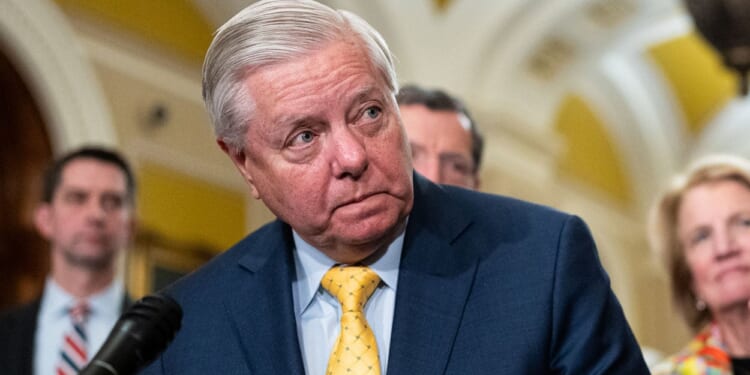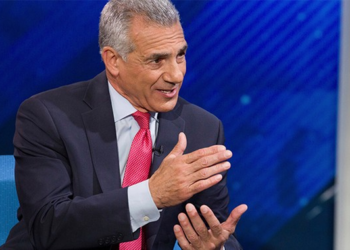South Carolina Republican Sen. Lindsey Graham’s bill to place sanctions on Russia seems like it would have no difficulty at all passing the Senate—but it has languished for months without action.
The inaction is not due to a lack of support, since Graham’s Sanctioning Russia Act of 2025 has 84 co-sponsors in the Senate, making it immune to a Senate filibuster or a presidential veto.
“There is bipartisan support… in the Senate to be much firmer and come down harder on [Russian President Vladimir] Putin. And I think we should be taking that step,” Sen. Andy Kim, D-N.J., a co-sponsor, told reporters Monday.
What’s more, Senate Majority Leader John Thune, R-S.D., has said he looks at the bill favorably as “a tool in the president’s tool chest that you can use against the Russians to get them to the table.” He is monitoring the administration’s negotiations to see when could be the right time to bring it to the Senate floor.
But with a bill that appears so easy to pass, why has there been no movement?
What’s in the Bill?
Graham’s legislation would require that the president make a determination every 90 days on whether Russia is still invading or planning to invade Ukraine.
If the answer is yes, then harsh sanctions would kick in, including revoking visas and blocking transactions of Russian government-connected individuals.
Additionally, Russia would be hit with “not less than” a 500% rate of duties on its imports into the United States.
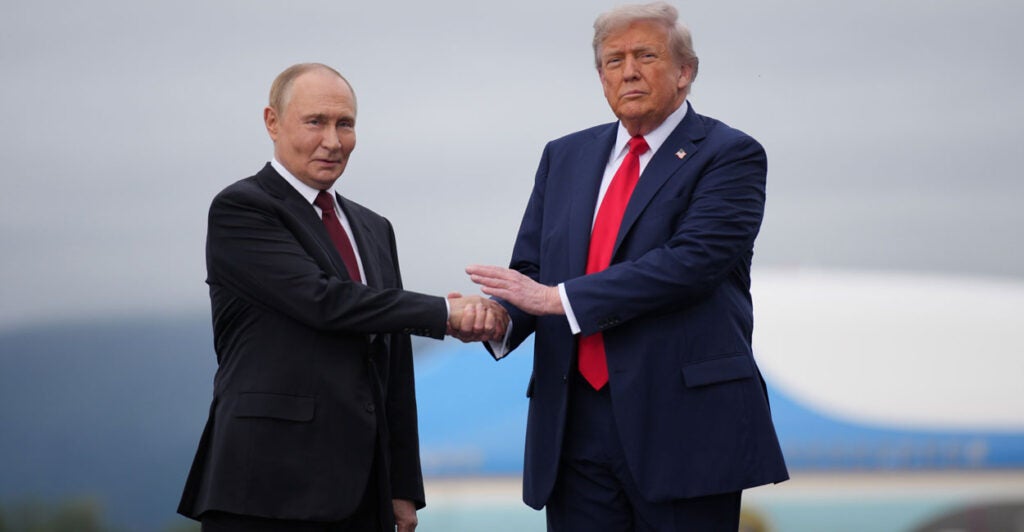
But perhaps the most drastic measure is that any country that knowingly imports uranium, natural gas, or petroleum products from Russia would be hit with its own “not less than” 500% rate of duties on its exports to the United States.
That would mean severe sanctions on large economies such as China and India, which import uranium and gas from Russia. The president would be able to waive those duties once for up to 180 days if he determines it is in the interest of national security.
Throughout his second term, the highest tariff rate President Donald Trump has imposed on China has been 145% and the highest he has imposed on India has been 50%. The administration has since backed off of the 145% tariffs on China and is negotiating trade deals with both countries.
Waiting for White House Signals?
Many Senate Republicans say they’re waiting on the White House’s thumbs-up and also monitoring Trump’s negotiations in the conflict.
“Who’s running foreign policy and who’s out there every day is [Secretary of State] Marco Rubio and the president,” Sen. Markwayne Mullin, R-Okla., a supporter of the bill, told The Daily Signal. “We don’t want to get ahead of them. We’re ready to go. When they say, ‘go,’ we’ll go.”
But that’s not to say there’s no impatience among some Senate Republicans to get moving on the sanctions.
“I hope so,” Sen. Thom Tillis, R-N.C., told The Daily Signal when asked if he wanted the bill to move quickly. “I’m 100% behind [Graham] trying to get it done. I think it ups the ante. If the president wants to have it held in the House, that’s a decision I trust him to make. But it doesn’t make sense to me to not have either of the two chambers act on it.”
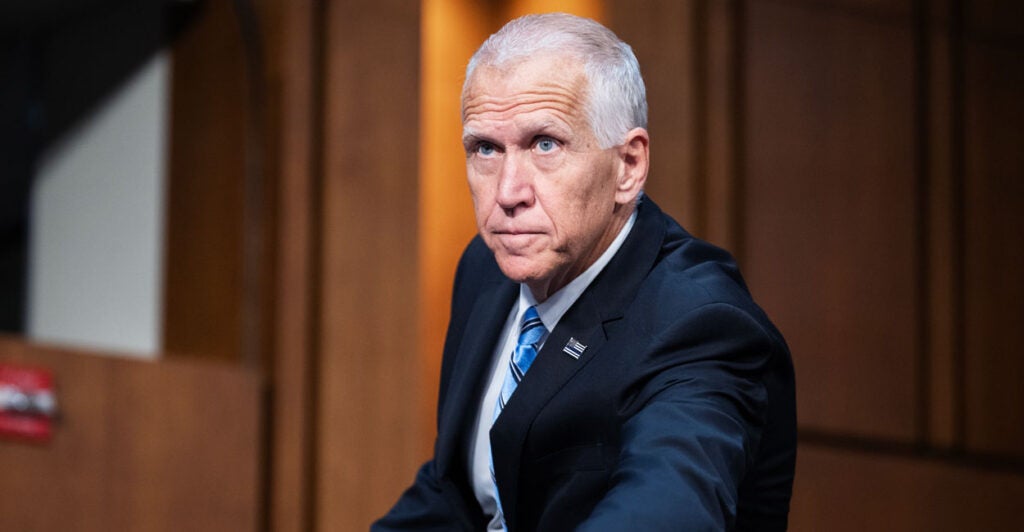
It remains unclear what the bill’s future would be in the House if it passed in the Senate. Rep. Brian Fitzpatrick, R-Pa., has a companion bill in the House that has 113 co-sponsors—57 Democrats and 56 Republicans.
Speaker of the House Mike Johnson, R-La., has expressed openness to the idea of advancing congressional sanctions.
Shortly before the most recent sanctions on natural gas companies implemented unilaterally by the executive branch, Johnson told reporters, “There is a big appetite among Republicans in the House and Senate … for tough sanctions on Russia” and that “Republicans in Congress are ready to provide support” for Trump’s negotiations “and any leverage that we can, including sanctions.”
Not Everyone in Senate Wants It
Despite the overwhelming number of Senate co-sponsors, the bill does have a handful of detractors in the Senate—including Republicans who say Trump can handle the Russia situation on his own.
Sen. Josh Hawley, R-Mo., for example, reacting to new, unilateral executive branch sanctions on Russian gas companies, told The Daily Signal that the Graham bill might not be necessary.
“I’ll defer to the leader on that when he wants to bring it to the floor. The president has put new sanctions on Russia, so I’m not sure it’s needed at this point,” Hawley said.
Similarly, Sen. Eric Schmitt, R-Mo., says he does not want to step on the president’s toes as he negotiates through the Russia-Ukraine war.
“My feeling is that we ought to give President Trump every opportunity to find peace, and that’s what he’s working on,” Schmitt told The Daily Signal. “So, if there is a time we need to move forward, I think all options are on the table, but my perspective has been that President Trump’s the guy who can deliver peace, and we ought to give him a chance to do it.”
Sen. Ron Johnson, R-Wis., also told The Daily Signal that he was delegating the sanctions decision to the president.
“I’ll let that [be] up to the administration in terms of how they want to handle it with their negotiations,” Johnson said. “It’s kind of up to the president to decide when he wants Congress to signal their support for sanctioning Russia.”
Is Delay Due to Trade Deals?
Sen. John Kennedy, R-La., is a supporter of tough sanctions on Russia to encourage the country to negotiate and is a cosponsor of Graham’s bill, but he doubts it will become law.
Why? Because he does not think the Trump administration would support legislation that interferes with its trade negotiations with China.
“I don’t think the president’s going to go with the Russian sanctions bill,” Kennedy told The Daily Signal. “I’ve offered an alternative to try to release $300 billion in seized [Russian] assets to Ukraine at a rate of $10 billion a month. I think that’s the best chance of getting the president on the board.”
He explained, “I don’t believe the president is ever going to agree to the sanctions, and I say that because they’re busy hammering out a trade agreement with China right now, and that’s in a delicate balance, and once they get that done, I don’t think they’re going to want to do anything to upset China.”
Kennedy added, “Is the President going to blow [the deal] up by supporting a sanction on the Chinese purchase of Russian oil? … I just don’t think that he will do that.”
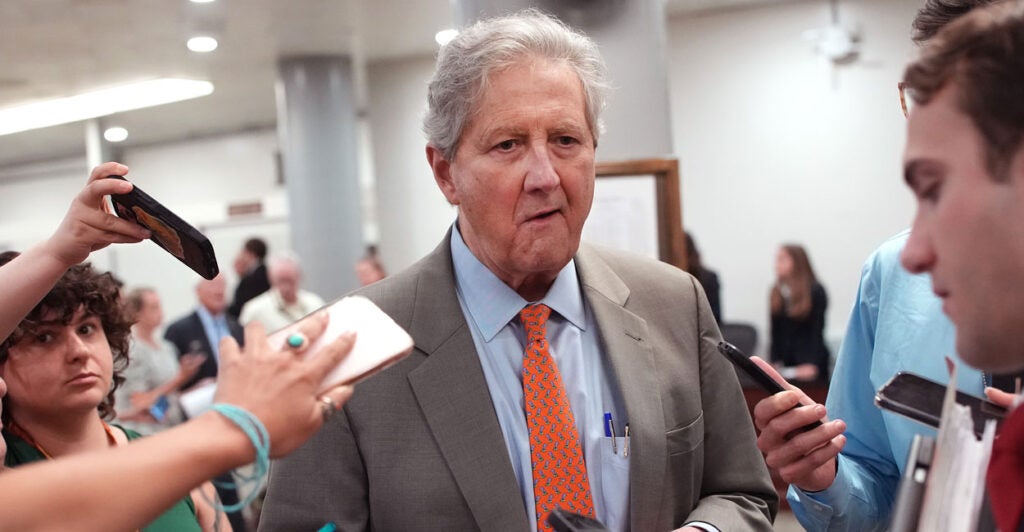
Nevertheless, Kennedy made clear that he is a supporter of sanctions.
“I will vote for the sanctions bill in a heartbeat, but I don’t think Sen. Thune wants to move the bill until the executive branch is comfortable, and I don’t believe the executive branch will ever be comfortable.”
Under Kennedy’s alternative proposal to hand Russian money to Ukraine, “You give that money to Ukraine at $10 billion a month, and just say, ‘Buy whatever missiles you want. If the president won’t sell you Tomahawks, they’re not the only missiles God ever made. Go buy other missiles and take out every weapons production plant and every oil refinery in Russia.’ That will bring them to be tamed because it will stop his cash flow, and that involves no American money. It doesn’t interfere with any trade deals.”
Kennedy added that he had presented his proposal to the White House.
“I’ve talked to the president about this. He seemed OK with it, but he didn’t categorically say ‘yes,’” Kennedy told The Daily Signal.
White House Wants Flexibility
When it comes to negotiating an end to the Russia-Ukraine war, it appears the White House wants maximum flexibility, while remaining open to legislation that assists it in its goals.
A White House official told The Daily Signal in a statement, “The White House is working with Congress to ensure introduced bills advance the president’s foreign policy objectives and authorities. The Constitution vests the president with the authority to conduct diplomacy with foreign nations. Any sanction package must provide complete flexibility for the president to continue to pursue his desired foreign policy.”

